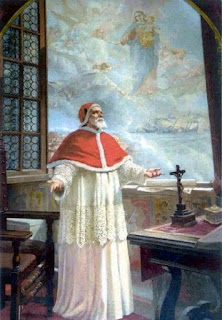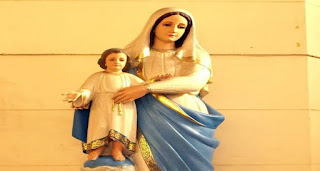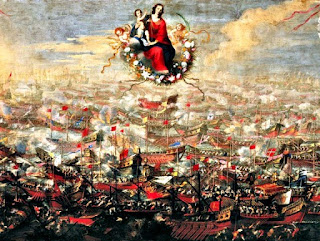STORY OF OUR LADY OF VICTORY IN THE BATTLE OF LEPANTO
Feast Day - March 23
For centuries the Ottoman Empire had been making advances into Europe, while also making lightning raids along the coastlines to pillage and take slaves. They intend to overwhelm all of Europe, and at that time Catholics stood almost alone against them as no Protestant force would do anything to oppose the invasion.
The advantage in this contest went strongly to the Turks, and so Pope Pius V implored all of Christendom to pray the Rosary of the Blessed Virgin Mary to obtain her intercession before the throne of God for their victory. Admiral Andrea Doria sailed to meet the Turks with an image of the Blessed Virgin prominently displayed in his flagship’s state room.
The Venetian forces on Cyprus had been under siege by the Turks during the time that the Catholic forces were preparing to meet them. On August 1 they surrendered after being assured that they could leave the island unopposed. The Ottoman commander broke his solemn oath, however, taking the Venetians captive and flaying their captain while he was yet alive. Once he had completed this unspeakable torture, his dead body was hung from a spar on Mustafa’s flagship alongside the heads of all the Venetian commanders. This was the type of barbarism the Catholic forces sailed to oppose.
The Ottoman Turks had not lost any significant naval engagements in the memory of any living man, yet they were defeated. It was widely recognized that the battle was won through the power of Mary, Our Lady of Victory. The Turks had come up like fire from the East, plundering, raping, enslaving, threatening to master the whole of Christendom, but had been defeated at Lepanto through the power of the Rosary.
The Turks had lost nearly 9 of every 10 ships, and 30,000 men went to a watery grave. The Holy League lost only 17 galleys and 7,500 men. Many historians rank Lepanto as the most decisive naval engagement since the Battle of Actium in 31 BC, proving to the Christians that the Turks could be beaten. Although the Turks soon rebuilt their fleet, many of their best soldiers and sailors were already dead at Malta and Lepanto.
This feast also celebrates another Christian victory, as in 1716, Mary, Queen of Victory, was chosen to protect her children again at Peterwardein. This battle was fought on August 5, 1716, between the Austrian army of Prince Eugene and the Turks at Peterwardein in Hungary, and it was also won through the power of Mary Most Holy.
 |
| Pope Saint Clement XI |
To help equip the Christian army against the Turks, Pope Clement XI emptied the Papal treasury.
The two armies met on the morning of the feast of Our Lady of the Snows; the Christian army was outnumbered ten to three; the enemy had the advantage of position; but the Christian strength lay in the right of their cause and in Mary, who watched over them. The battle was long and hot, but, behind the lines in the churches of Europe, Catholics prayed: their prayers were heard. That evening the sun set on a free Hungary. Mary’s men had won the day; Mary’s banner floated victoriously over a Christian land.
The news filled the Christian world with joy, but nowhere more than at Rome. In thanksgiving to the Mother of God for her help, glorious, solemn, pontifical ceremonies of gratitude were held in the basilica of Saint Mary. After Lepanto, Pius V instituted the feast of the Holy Rosary in Rome, and Clement XI extended it to the world.
Today other more sinister errors eat at the heart of Christian culture: Naturalism undermining man’s faith in God and himself. Communism is Mary’s enemy; it transforms the state into a god to which men must be sacrificed. Men are children of God, sons of Mary, not slaves of the state.
We must appeal to Our Lady, against the errors of our time; she is our guide, our Queen of Victories and of Peace. For her and for her blessed Son we struggle, and on her powerful intercession with the Prince of Peace we place our trust.
The two armies met on the morning of the feast of Our Lady of the Snows; the Christian army was outnumbered ten to three; the enemy had the advantage of position; but the Christian strength lay in the right of their cause and in Mary, who watched over them. The battle was long and hot, but, behind the lines in the churches of Europe, Catholics prayed: their prayers were heard. That evening the sun set on a free Hungary. Mary’s men had won the day; Mary’s banner floated victoriously over a Christian land.
The news filled the Christian world with joy, but nowhere more than at Rome. In thanksgiving to the Mother of God for her help, glorious, solemn, pontifical ceremonies of gratitude were held in the basilica of Saint Mary. After Lepanto, Pius V instituted the feast of the Holy Rosary in Rome, and Clement XI extended it to the world.
Today other more sinister errors eat at the heart of Christian culture: Naturalism undermining man’s faith in God and himself. Communism is Mary’s enemy; it transforms the state into a god to which men must be sacrificed. Men are children of God, sons of Mary, not slaves of the state.
We must appeal to Our Lady, against the errors of our time; she is our guide, our Queen of Victories and of Peace. For her and for her blessed Son we struggle, and on her powerful intercession with the Prince of Peace we place our trust.





Post a Comment